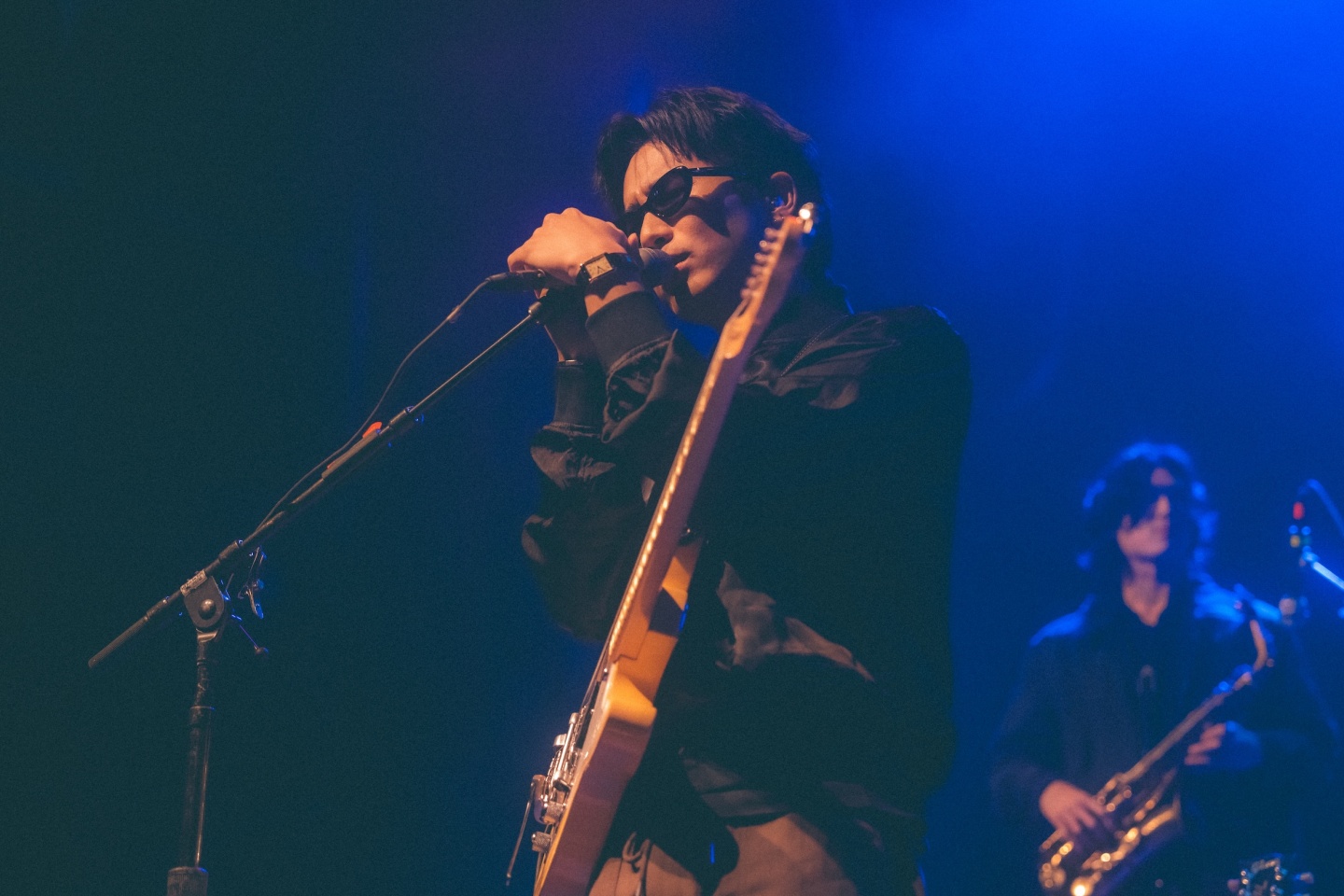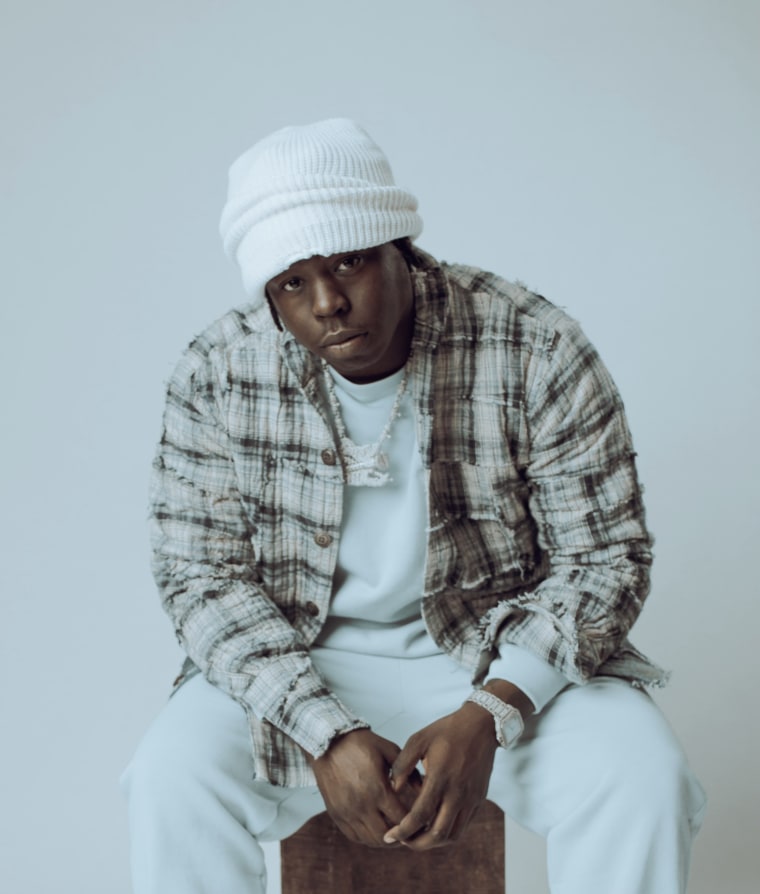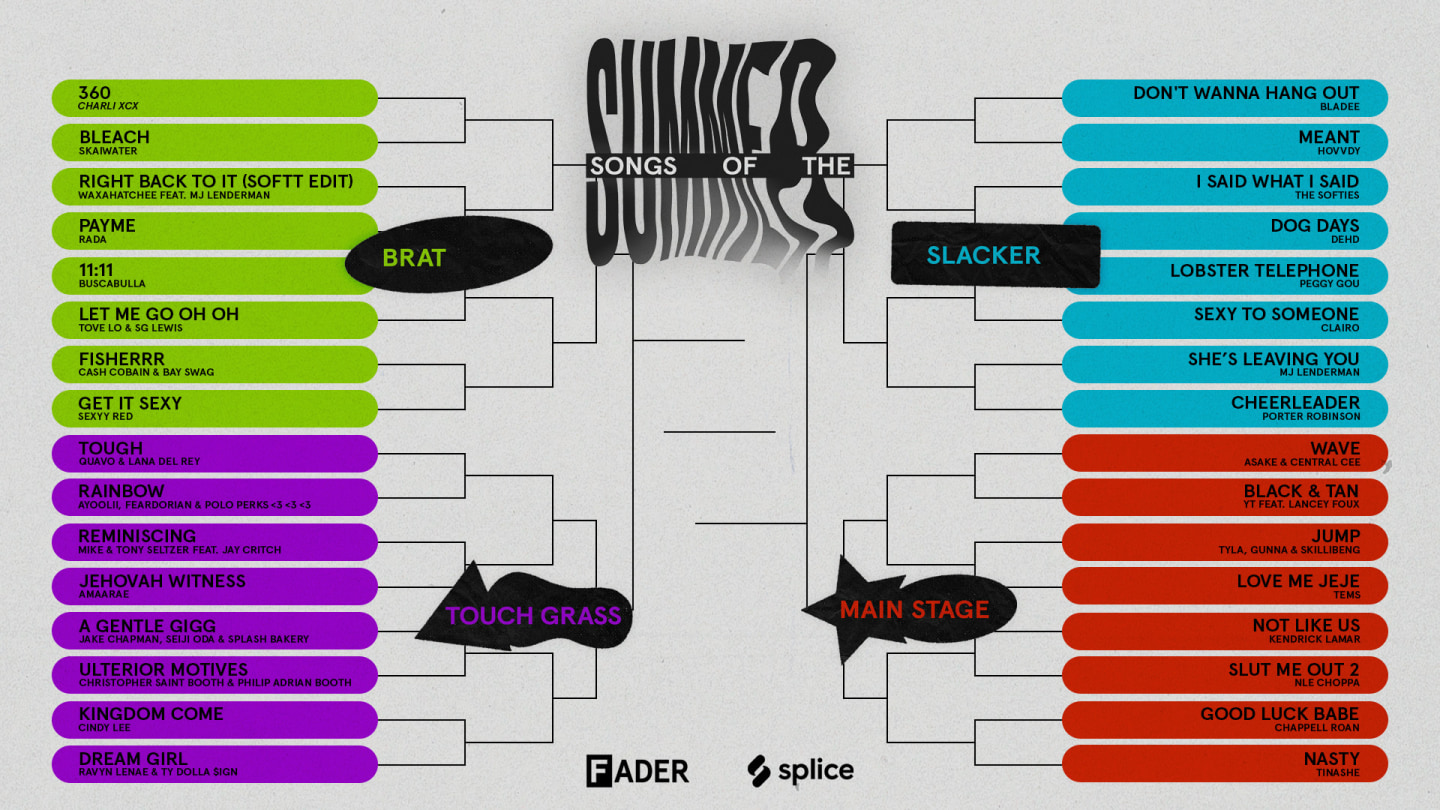Roger Tam
It’s a Friday night at Manhattan’s Hammerstein Ballroom and 12,000 phones are up in the air. On stage, a five-piece band — a drummer, bassist, keyboardist, saxophonist, and guitarist frontman dressed in all black — are playing their biggest song, “Seasons,” a grand and melancholic jazz-rock ballad about pining. When the hook comes in, “But I’ll pray for you all the time / If I could be by your side / I’ll give you all my life, my seasons,” the room erupts in a thousands-strong singalong. Near me, a girl is crying and screaming and singing at the same time though she’s still clutching her phone straight up like an antenna. It, and the thousands around it, never comes down the rest of the show.
This is the kind of fervent devotion wave to earth, perhaps South Korea’s biggest indie rock band at the moment, inspires. Since 2023, the Seoul-based trio — consisting of frontman and guitarist Daniel Kim, bassist John Cha, and drummer Dong Kyu Shin — have sold out two separate U.S. tours — a rarity for K-pop groups, much less K-indie rock outfits. Tonight’s show is the penultimate stop of their latest 30-date trek that saw them playing rooms just one tier size below arenas. But the data can’t capture the pure intensity of their fandom, which I witness firsthand as I watch hordes of young women (and guys) scream and cry for an hour straight.
A few days after the show, I meet up with the band at a Midtown espresso bar where they arrive late, apologizing profusely, because they accidentally went to a different coffee shop instead. They’re coordinated in black, and their demeanors are quiet and subdued. Kim, in a low-brimmed dad cap obscuring a sharp jawline and Comme Des Garçon cardigan, slides himself into the corner of a booth, followed by Cha, whose face is alert and inviting; Shin is the most flashy of the three; nearly every finger on his hands bears a shiny big ring.
It wouldn’t be totally inaccurate to say that wave to earth have become the somewhat unofficial ambassadors of the rapidly growing South Korean indie rock scene. Since breaking out in 2020 with “Seasons,” which soundtracked over a million videos on TikTok, their career has gone turbo mode, sending them on back-to-back treks throughout Europe and the U.S.
“Our music is famous, but we are not famous, personally,” Kim says, modestly.
Cha adds, “[Our fans] don’t recognize us that much. It’s more like, ‘Oh, this music is yours,’ but they’re kind of surprised [when they see us]. I like it that way.”
Still, with each trip, the band has courted new rounds of interviews and interested industry meetings. But most of the press that’s been published has elided the sheer force of their rise. How exactly did a South Korean band making downtempo, jazz-influenced rock music become one of the most successful K-indie acts to crossover?
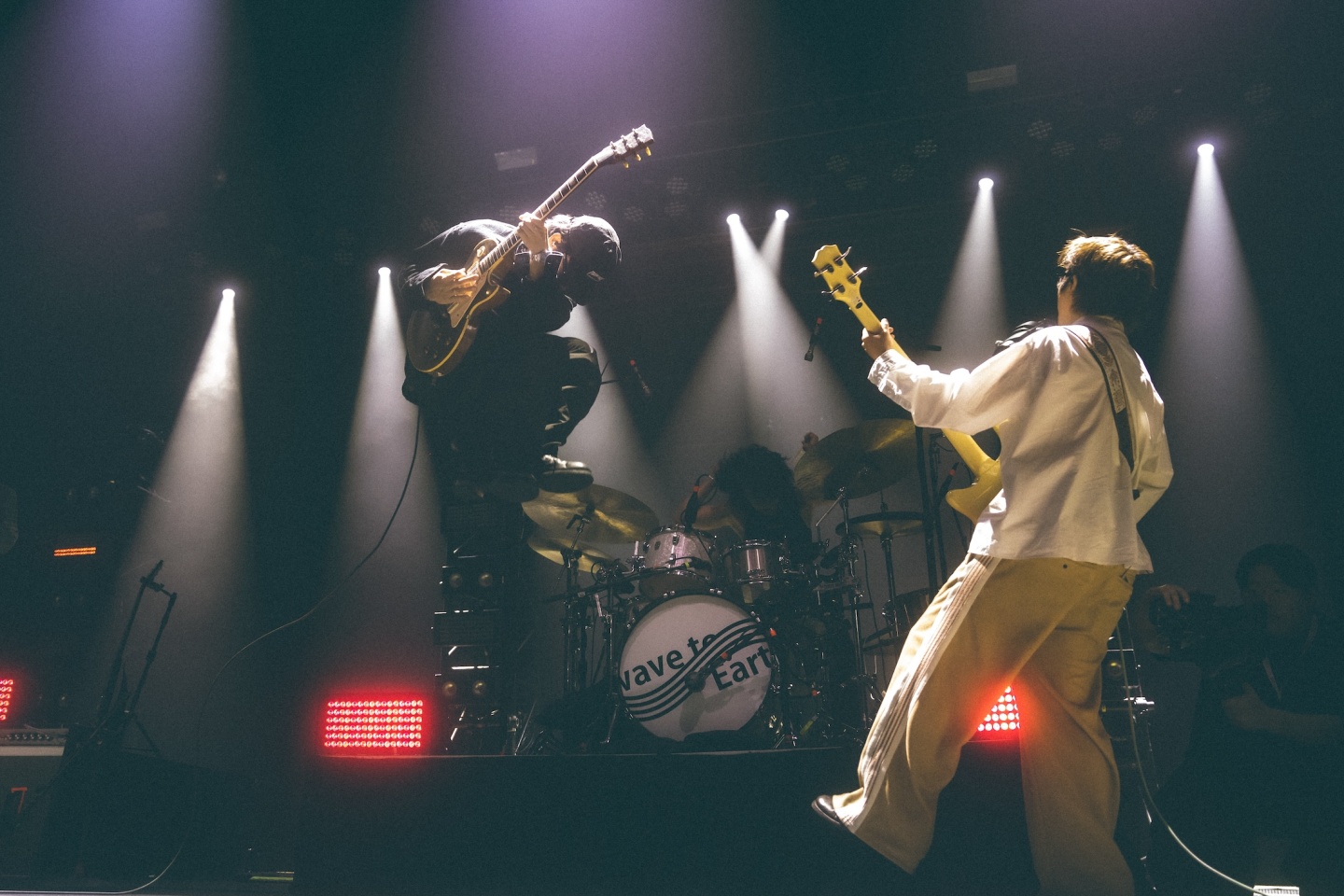
Roger Tam
wave to earth released their first song, “wave,” in 2019, but their story goes back to 2012, when frontman Kim and drummer Shin first met while auditioning for a church band. Kim, who’d grown up inheriting his older brother’s electric guitar, was looking for a venue to play music and quickly eyed the lanky limbed drummer as a potential partner. Though they didn’t end up joining the church group (“[The church] was kind of conservative, and said, “You shouldn’t do outside world’s music.’ I got sick of it,” Kim says), Kim and Shin did make good on their promise to jam together and started a few projects. Eventually they went their separate ways. “I made a promise with Dong Kyu to join again [in another group] someday,” Kim says.
That someday arrived in 2018, after the two had graduated from an arts high school in Seoul and started meeting up again to play music together. Still a two-piece at the time, Kim felt they needed a bassist to fill out their sound and reached out to Cha, who’d also gone to art school with them and just returned from his mandatory two-year military service.
“I said, why not?” Cha recalls. He brought his bass to a quick jam session, and “we suddenly felt that electric field.” Thus, wave to earth was born.
“Our music is famous, but we are not famous, personally.”

Roger Tam
At the time, Kim says the indie music scene in South Korea was such that there was little to no belief an independent group like wave to earth could ever go global — “It was really still hard to break through,” he says. But Cha credits Kim’s sheer determination and belief in the music as the reason for the band’s success, describing him as a “visionary.” “When he made me listen to his first demo of wave to earth,” Cha says, “He was already visualizing, this is gonna be big.”
Kim, whom Cha describes as a “rocker guy,” had already started multiple band projects by then (including one called The Poles which is still active and most recently released music in April), and had a life-long dream of making it big. From the beginning, the members say, Kim strategically positioned wave to earth with global aspirations.
Guitar-led rock music from South Korea has been steadily crossing over to the U.S. In recent years, bands like The Rose and Day6 have amassed millions-strong international followings and high-profile performance slots at festivals like Coachella. Still, wave to earth still sticks out as an anomaly within this movement.
For starters, they sing largely in English — their most recent album, 2024’s play with earth! 0.03, contains zero Korean — while the sound they’re mining — peaceful, breezy tunes about love and enjoying the beauty of the earth — isn’t exactly rockstar material.
Their first-ever release “wave” is a tidy example of the band’s sonic philosophy: A sweet and surfy jam filled with twinkling synths, Kim croons about the waves in a lovers’ eyes and how their “words are like a flowing star.”
Per Kim, the motto of the band “is love and being respectful to each other,” which explains why motifs of nature, sunsets, and the soft, invisible forces that link us all together dominate their songs. Even gloomier thoughts and failed romances are draped with a rosy, romantic sheen as on “holyland,” a song that begins with Kim “walking along with grief” but still taking the time to “lay in the grass, daydream in the sun.”
Adding darker colors to their gentle optimism helps wave to earth escape the sanguine. Steffi L, a 28-year-old fan, found herself resonating with the “calm” and “uplifting” music that refused to condescend. “It is a nice thing to have music that has that kind of positivity,” she says. “I don’t think it’s false positivity or toxic positivity either, because I feel like the lyrics do recognize that the world is a little bit ugly, but there is still light or things to love about it.”
Online, the praise and adoration from fans is more effusive. Take a scroll through the band’s comments on TikTok and Instagram: “My comfort band,” “I feel at peace when I listen to them,” “their music changed my life.” The fervor and volume of these sentiments indicate that, whatever wave to earth are doing, they’re the only ones who can do it.
The band members agree. In fact, Kim says he wrote their gargantuan single, “Seasons” — on which he tells a lover they can’t be together but vows to follow them through “the seasons” of their life — because he “had the feeling that people need this song.”
“When I wrote that song, right after, I [knew] this [would] be the biggest hit for the band,” Kim says. How? He pauses to look at me in disbelief. “Because it’s a really good song!”

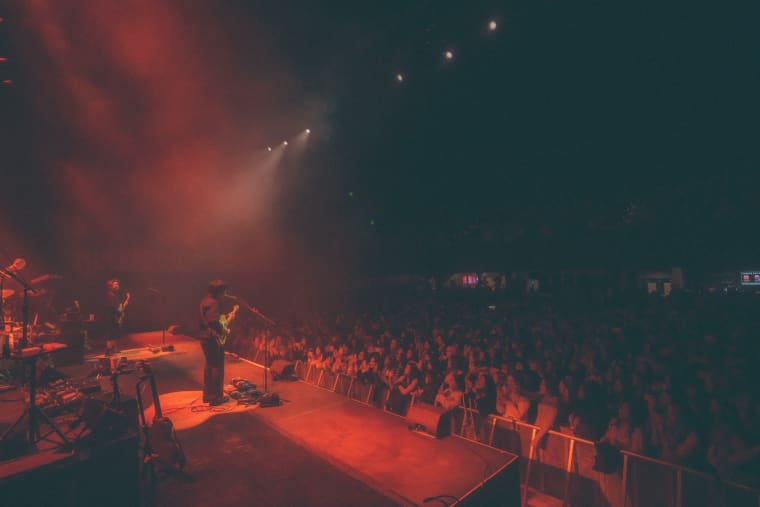
It also doesn’t hurt that all three members of the band exude charisma. At the Hammerstein Ballroom show, Kim, in shades and his arm covered in tattoos, is a natural heartthrob as he commands sing-a-longs and stomps around. Each person turns their instrument into an extension of their body during the impromptu jams before and after songs, where Kim shreds and Dong Kyu speed drums into oblivion.
Jess S., a 41-year-old fan from NYC, cites their performances as a rarity in the concert circuit today: “As a fan who lived through one of the golden ages of modern music in the ‘90s, like alt rock shoegaze, lo-fi college radio, and so on — wave to earth brings me back to a time when music felt more real and more accessible and immediate.” Their audiences respond to their energy in kind, screaming to every lyric no matter if it’s in English or Korean.
“Every time,” Kim says of their fans’ participation. “It’s not easy to sing along in Korean.”
It’s this combination — their songs’ yearning themes, impressive musicianship, and undeniable stage presence — that has propelled wave to earth to unseen heights for a band of their origins. After releasing music independently for years, they signed on with the South Korean record label Wavy in 2021 “to handle more stuff to be big,” Cha says.
“I think [they are] Korean no. 1 band! wave to earth is best band in Korea,” their Wavy manager, who’s been sitting next to me, suddenly chimes in. The band busts out laughing, shaking their heads, reluctant to agree. “We need to be humble,” Kim jokes, adding air quotes around the word.
“When he made me listen to his first demo of wave to earth, he was already visualizing, this is gonna be big.”
The band are “thankful” for the places their career has taken them, and are doing their best to adjust to their new reality. It brought major creative changes: a saxophonist and keyboardist have joined their latest tour dates, and Kim is challenging himself to think and write more fluently in English (previously, he’d write lyrics in Korean and translate). During his downtime, he’s listening almost exclusively to American music: Clairo, Ryan Beatty, and more.
It’s more in the personal arenas where the new friction has taken its toll. “It went so fast,” Cha says of their rise. “We didn’t have much time to really spend out[side] of the music business as friends. We need more time to spend with each other, but these days we know that this chance is never [going to] be the same.”
There’s no time for a break or vacation as they face a busy schedule that has them booked out through 2025. After a few more days in New York City, they’ll be flying back home to Seoul to prep for more shows — because, ironically, after conquering the West, they’re just now setting their sights back on South Korea.
“[Our South Korean fans] call us the tour band,” Cha jokes. “Come to Korea, come to Korea,” Kim mimics. “We’re finally coming this time,” Cha says.

